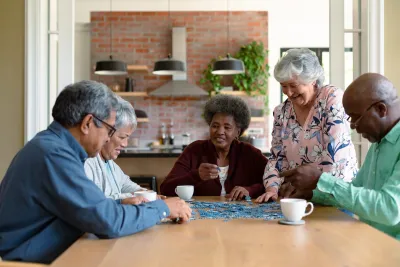Designing for the unique needs of elderly people can help them maintain social connections and mental acuity.

Aging — that of ourselves or of our loved ones — can be a painful subject. Too often, elderly people and their families fear the prospect of moving their older relatives to a senior living facility, worried that it will sever their social connections and accelerate their mental degradation.
But as Michelle Gagnon-Creeley writes in an article for Happy Cities, it doesn’t have to be this way. Designing buildings and communities with older people in mind can support their independence while offering a sense of safety and community.
“Socially connected neighbours are healthier, more resilient, and often able to stay longer in their home and community as they age. The design of our homes can help foster these connections,” Gagnon-Creeley adds. The article summarizes findings from a Happy Cities study that analyzed 20 senior housing buildings in British Columbia, evaluating how they each foster connection and community.
The article outlines four key strategies for designing age-friendly homes: “social homes” that offer opportunities for interaction and accommodate changing mobility needs; “social circulation” that transforms transitional spaces like stairwells and hallways into comfortable, social spaces; “social amenities” that offer activities for stimulation and gathering; and “social building edges,” the transition zones between public and private spaces that can be elevated to provide a visual connection to the street and outdoor recreation areas.
FULL STORY: What makes an age-friendly home?

Maui's Vacation Rental Debate Turns Ugly
Verbal attacks, misinformation campaigns and fistfights plague a high-stakes debate to convert thousands of vacation rentals into long-term housing.

Planetizen Federal Action Tracker
A weekly monitor of how Trump’s orders and actions are impacting planners and planning in America.

In Urban Planning, AI Prompting Could be the New Design Thinking
Creativity has long been key to great urban design. What if we see AI as our new creative partner?

Chicago’s Ghost Rails
Just beneath the surface of the modern city lie the remnants of its expansive early 20th-century streetcar system.

Baker Creek Pavilion: Blending Nature and Architecture in Knoxville
Knoxville’s urban wilderness planning initiative unveils the "Baker Creek Pavilion" to increase the city's access to green spaces.

Pedestrian Deaths Drop, Remain Twice as High as in 2009
Fatalities declined by 4 percent in 2024, but the U.S. is still nowhere close to ‘Vision Zero.’
Urban Design for Planners 1: Software Tools
This six-course series explores essential urban design concepts using open source software and equips planners with the tools they need to participate fully in the urban design process.
Planning for Universal Design
Learn the tools for implementing Universal Design in planning regulations.
planning NEXT
Appalachian Highlands Housing Partners
Mpact (founded as Rail~Volution)
City of Camden Redevelopment Agency
City of Astoria
City of Portland
City of Laramie





























